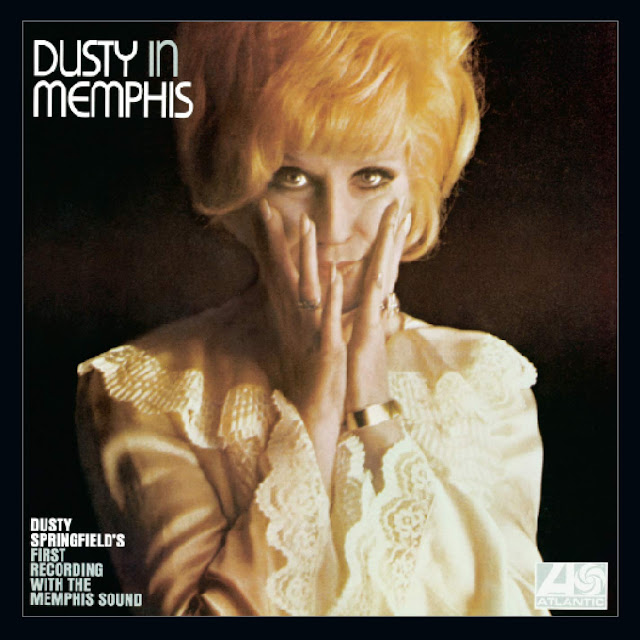When Southern Soul Met the Swinging Sixties
I didn’t discover British pop singer Dusty Springfield’s superb “Southern Soul” album, Dusty in Memphis, until 1989, twenty years after its initial release. I wasn’t the only one to come late to this affecting yet unassuming work.
It arrived in March 1969, the same year as Abbey Road. But unlike The Beatles' penultimate album, Springfield’s defining LP was a commercial flop until people discovered it in second-hand record shops and thrift stores and gradually elevated it to cult status.
It arrived in March 1969, the same year as Abbey Road. But unlike The Beatles' penultimate album, Springfield’s defining LP was a commercial flop until people discovered it in second-hand record shops and thrift stores and gradually elevated it to cult status.
Now, Rolling Stone ranks Dusty in Memphis at #83 among the 500 greatest albums of all time. In 2020, the Library of Congress selected it for preservation in the National Recording Registry for being "culturally, historically, or aesthetically significant.”
What is it about this sweet, odd recording that draws me in so? A blend of pop and R&B with country and even jazz elements, it feels like a ’60s time capsule, yet it keeps its freshness and immediacy, as if every new listen were the very first.
The album’s best-known song, the soulful “Son of a Preacher Man,” may be impressive, but so are the others, from the spicy opener “Just a Little Lovin’” to the wistful “Just One Smile” to the dizzying “Windmills of Your Mind.” “Preacher Man” was featured in the landmark 1994 film Pulp Fiction, which inspired a new generation of listeners.
Despite their immense popularity, some great albums, like this one, still seem to be made just for one's solo listening enjoyment. Joni Mitchell's Blue has this trait. So does David Bowie's Hunky Dory.
Springfield, who had a host of personal problems, argued with her producers over every track that would be included on the final album, insisting that none were good enough. Later, it was revealed that she doubted herself and feared being compared to Aretha Franklin and other legends who had recorded in Memphis. (Giving in to this insecurity, Springfield ironically put down the final vocals of Memphis in New York City.)
You can almost feel her ambivalence in the final product. Springfield’s hesitation adds to the album's greatness.
When I listen to Dusty in Memphis, I feel transported to the Swinging Sixties. Springfield blazed a path that later Blue-Eyed Soul singers like Adele and Amy Winehouse would tread.
This blend of soul music, Southern spirit, 1960s nostalgia, and a female voice in the British Invasion creates a sublime collection of songs. If you know, you know.
What is it about this sweet, odd recording that draws me in so? A blend of pop and R&B with country and even jazz elements, it feels like a ’60s time capsule, yet it keeps its freshness and immediacy, as if every new listen were the very first.
The album’s best-known song, the soulful “Son of a Preacher Man,” may be impressive, but so are the others, from the spicy opener “Just a Little Lovin’” to the wistful “Just One Smile” to the dizzying “Windmills of Your Mind.” “Preacher Man” was featured in the landmark 1994 film Pulp Fiction, which inspired a new generation of listeners.
Despite their immense popularity, some great albums, like this one, still seem to be made just for one's solo listening enjoyment. Joni Mitchell's Blue has this trait. So does David Bowie's Hunky Dory.
Springfield, who had a host of personal problems, argued with her producers over every track that would be included on the final album, insisting that none were good enough. Later, it was revealed that she doubted herself and feared being compared to Aretha Franklin and other legends who had recorded in Memphis. (Giving in to this insecurity, Springfield ironically put down the final vocals of Memphis in New York City.)
You can almost feel her ambivalence in the final product. Springfield’s hesitation adds to the album's greatness.
When I listen to Dusty in Memphis, I feel transported to the Swinging Sixties. Springfield blazed a path that later Blue-Eyed Soul singers like Adele and Amy Winehouse would tread.
This blend of soul music, Southern spirit, 1960s nostalgia, and a female voice in the British Invasion creates a sublime collection of songs. If you know, you know.
But if you don’t already know Dusty in Memphis, don’t hesitate to join the party late. Everyone else did, too.
--
Don't go anonymous: Please type your name after your comments. It's as simple as that.


Although I admittedly know very little about Dusty, this makes me want to listen to the record.
ReplyDeleteShe was such a unique talent.
ReplyDeleteSuch a lovely, thoughtful reminder of an artist and a particular time in my growing up with music. Thank you. I love your weekly blog.
ReplyDeleteI love Dusty in Memphis!! I have it on vinyl and play it often. It’s great for solitary intense listening but also great for the beginning hour of a cocktail party! Btw, this is Vincent.
ReplyDelete